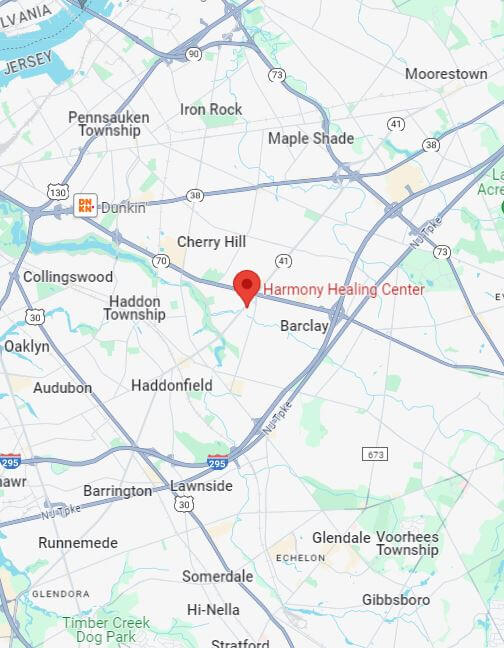Harmony Healing Treatment Center in Cherry Hill, New Jersey, offers comprehensive addiction and mental health treatment. We provide holistic care, evidence-based therapies, and personalized plans to support recovery. Our compassionate team ensures a nurturing environment for lasting recovery and enhanced mental well-being.
At Harmony Healing, we proudly offer cognitive behavioral therapy (CBT) as part of our mental health and addiction treatment programs. CBT is a schema-focused therapy that uses an evidence-based approach that helps patients identify and change negative thoughts and behaviors, fostering healthier coping mechanisms and improved emotional regulation and interpersonal communication. By integrating CBT into our comprehensive treatment plans, we equip clients with tools to manage their conditions effectively and sustain long-term recovery. For more information about our treatment programs and how we can support you or your loved ones, please call or contact us at Harmony Healing.
Understanding Cognitive Behavioral Therapy (CBT): What Is It?
Cognitive behavioral therapy (CBT) is a psychotherapy treatment technique that helps patients identify and work to change negative thoughts and behaviors. It focuses on developing coping strategies, improving emotional regulation, and fostering healthier thinking. Cognitive-behavioral therapy is often used to treat mental health conditions and addiction.
CBT works by helping patients recognize the connections between their thoughts, emotions, and behaviors. Through structured sessions, clients learn to challenge and reframe distorted thinking, ultimately leading to more positive outcomes. This evidence-based approach is highly efficient in treating OCD, bipolar, anxiety, depression, addiction, and other mental health conditions. Are you seeking a caring recovery center in the tri-state area offering evidence-based behavioral therapy techniques? Contact us at Harmony Healing Center or call our team to discuss your rehab treatment options.
What Is the Success Rate of CBT?
Cognitive behavioral therapy (CBT) boasts a high success rate, with approximately 60-80% of patients experiencing significant improvement in their symptoms. This evidence-based approach is particularly effective for treating anxiety, bi-polar, OCD, depression, and various other mental health conditions, making it a widely recommended therapy.
Studies consistently demonstrate CBT’s efficacy across diverse populations and disorders. For example, around 70% of patients with anxiety disorders report substantial relief, while approximately 60% of individuals with depression experience marked improvements. These success rates highlight CBT’s role as a cornerstone of effective mental health treatment, providing lasting benefits for many. Contact us at Harmony Healing Drug and Alcohol Addiction Treatment Center to inquire about our mindfulness-based therapy techniques, or call our team to discuss our success using CBT for treatment.
How Long Is the CBT Treatment Process?
The duration of cognitive behavioral therapy (CBT) treatment varies depending on certain factors, including the patient’s mental health condition, treatment goals, and progress. In general, CBT is a short-term therapy approach, lasting anywhere from 12 to 20 sessions spread over several weeks or months. However, the length of treatment may be adjusted based on the individual’s response to therapy.
Throughout the CBT treatment process, therapists work collaboratively with clients to identify and address cognitive distortions, develop coping skills, and achieve treatment goals. Regular sessions provide opportunities to practice new skills, monitor progress, and adjust treatment as needed. The goal of CBT is to equip patients with the strategies they need to manage their symptoms and maintain long-term psychological well-being effectively.
What Is the Difference Between Cognitive Behavioral Therapy (CBT) and Dialectical Behavior Therapy (DBT)?
Cognitive behavioral therapy (CBT) and dialectical behavior therapy (DBT) are widely recognized therapeutic approaches, yet they diverge in their emphasis and methodologies. CBT primarily addresses cognitive distortions and dysfunctional behaviors by guiding patients to identify and challenge negative thought patterns. It modifies behaviors and beliefs to alleviate symptoms across various mental health conditions.
You may be wondering about the similarities and differences between DBT vs CBT. Conversely, DBT integrates components of CBT with mindfulness techniques and acceptance strategies. Developed to treat specifically borderline personality disorder (BPD), DBT strongly emphasizes enhancing emotion regulation skills, distress tolerance, and interpersonal effectiveness. By blending cognitive restructuring with mindfulness practices, DBT offers a holistic approach to managing intense emotions and fostering adaptive responses to life’s challenges. Contact us at Harmony Healing Center in Cherry Hill, NJ, to inquire about our therapy programs and discuss how CBT therapy could fit into your treatment plan.
What Is a Cognitive Behavioral Therapy (CBT) Treatment Center?
A cognitive behavioral therapy (CBT) treatment center specializes in providing structured, evidence-based therapy to patients seeking to treat mental health disorders and behavioral issues. These centers employ trained therapists who guide clients through CBT techniques to identify and change negative thought patterns and behaviors. The therapy focuses on improving emotional regulation, developing coping strategies, and fostering healthier thinking.
CBT treatment centers cater to a wide range of conditions, including anxiety, depression, PTSD, and substance abuse. With 60-80% success rates, these centers offer effective solutions for many. In New Jersey alone, approximately 18,000 residents benefit from CBT. At the same time, nationwide, around 2.6 million people utilize this therapy for both mental health disorders and other reasons, underscoring its widespread efficacy and acceptance. Contact us at Harmony Healing Alcohol and Drug Addiction Treatment Center or schedule your free behavioral analysis assessment and start the treatment process today.
Contact Us for a Free Assessment
Are you ready to turn the page and begin a new chapter in your story? We have the tools you need to transform your life. Let’s talk about what’s next.

What Are Common Disorders Treated With Cognitive Behavioral Therapy (CBT) in New Jersey?
Cognitive behavioral therapy (CBT) is utilized in New Jersey to treat mental health and behavioral disorders. Renowned for its effectiveness, CBT helps patients identify and modify negative thought patterns and behaviors. Common disorders treated with CBT include anxiety, depression, PTSD, and substance abuse. The following sections will delve into how CBT explicitly treats these conditions.

Cognitive Behavioral Therapy (CBT) for Anger Problems
Cognitive Behavioral Therapy (CBT) for Anxiety and Panic Attacks
Cognitive Behavioral Therapy (CBT) for Bipolar Disorder
Cognitive Behavioral Therapy (CBT) for Depression
Cognitive Behavioral Therapy (CBT) for Substance Misuse
Cognitive Behavioral Therapy (CBT) for Eating Problems
Cognitive Behavioral Therapy (CBT) for Hoarding
Cognitive Behavioral Therapy (CBT) for OCD
What Are the Therapeutic Techniques of CBT?
Cognitive behavioral therapy (CBT) utilizes therapeutic techniques like cognitive restructuring, aiding individuals in identifying and challenging negative thoughts. Through guided exercises, clients assess evidence supporting their beliefs, fostering balanced thinking. Additionally, behavioral activation encourages engagement in fulfilling activities to combat depression or anxiety, promoting emotional well-being.
Additionally, exposure therapy is used to help individuals confront situations or stimuli in a controlled and gradual manner, reducing anxiety and desensitizing them to triggers. This technique is often employed in treating phobias, PTSD, and obsessive-compulsive disorder (OCD). Moreover, relaxation techniques such as self-soothing, deep breathing, progressive muscle relaxation, and mindfulness meditation are integrated into CBT to help individuals manage stress, anxiety, and physiological arousal. These therapeutic techniques, combined with homework assignments and skill-building exercises, empower individuals to challenge negative thinking patterns and behavior, ultimately promoting psychological well-being and resilience.
Do Mental Health Centers Offer Cognitive Behavioral Therapy (CBT) Near Me?
Many mental health centers offer cognitive behavioral therapy (CBT) as a primary treatment approach. Harmony Healing Center in Cherry Hill, New Jersey, specializes in comprehensive therapy services, including Dialectical Behavior Therapy (DBT), a form of CBT that focuses on mindfulness, emotion regulation, and interpersonal skills and is beneficial for various mental health conditions.
At Harmony Healing Center, our experienced therapists are dedicated to offering our patients personalized and evidence-based treatment to meet each client’s needs. Whether you’re seeking therapy for depression, anxiety, trauma, or substance misuse, we offer a supportive and nurturing environment where you can receive the specialized care you deserve. Contact us today to learn more about our CBT and DBT programs and how we can help you better your mental health and well-being. Call us to schedule a free assessment and see if CBT suits your treatment needs.
Does Health Insurance Cover CBT in New Jersey?
Health often covers cognitive behavioral therapy (CBT) in New Jersey. Many insurance plans recognize CBT as a clinically proven treatment for various mental health conditions and include it in their coverage options. However, coverage varies depending on member’s insurance plans, so it’s essential to check with your provider to understand your benefits and any out-of-pocket costs.
It’s common for health insurance plans in New Jersey to offer coverage for CBT sessions, mainly when referred by a licensed mental health professional. Some plans require a copayment for each session, while others may cover the total cost. Additionally, insurance coverage may depend on the diagnosis and medical necessity determined by your healthcare provider. It’s important to contact your insurance company directly or consult your policy documents to determine the extent of coverage for CBT services and any requirements for reimbursement. Complete an insurance verification form to further understand your coverage with us at Harmony Healing Alcohol and Drug Addiction Treatment Center.

Are There Cognitive Behavioral Therapy (CBT) Addiction Treatment Centers in New Jersey?
Yes, there are cognitive behavioral therapy (CBT) addiction treatment centers in New Jersey. Harmony Healing Center, located at 401 Kings Highway S, Cherry Hill, NJ 08034, offers various treatment options in the Garden State, including partial hospitalization programs (PHP) with housing, intensive outpatient programs (IOP), medication-assisted treatment (MAT), and standard outpatient services.
Harmony Health Center – Cherry Hill, New Jersey
401 Kings Highway South
Building #1 Tara Corporate Park
Cherry Hill, NJ 08034
What Are the Types of CBT?
Cognitive behavioral therapy (CBT) comprises diverse approaches designed to target specific mental health issues and behaviors. From traditional CBT to specialized methods like dialectical behavior therapy (DBT) and acceptance and commitment therapy (ACT), each offers distinct therapy strategies for fostering psychological well-being and improving coping skills.
Mindfulness-Based Cognitive Therapy (MBCT)
Mindfulness-based cognitive therapy (MBCT) integrates core mindfulness practices with cognitive behavioral techniques to combat depression and anxiety. By nurturing present-moment awareness and accepting thoughts without judgment, MBCT aids in breaking cycles of negative rumination. Structured sessions and guided mindfulness exercises empower participants to observe emotions without attachment, mitigating relapse risks and enhancing emotional fortitude.
In New Jersey, MBCT has emerged as a valuable tool for patients struggling with recurrent depression and anxiety. By integrating mindfulness principles and validation strategies into therapy, MBCT equips participants with practical skills for managing stress, creating validation principles, regulating emotions, and enhancing overall well-being. Many patients have reported vast improvements in their mood and quality of life following participation in MBCT programs, highlighting its effectiveness as a complementary approach to traditional cognitive behavioral therapy. Contact us at Harmony Healing Center to access our mindfulness-based therapy benefits, or call us to discuss the admissions process for treatment.
Dialectical Behavior Therapy (DBT)
Dialectical behavior therapy (DBT) originated as a treatment for borderline personality disorder (BPD) but has evolved to treat various mental health issues like mood disorders, substance misuse, eating disorders, and PTSD. Dialectics focuses on building skills in mindfulness, distress tolerance, emotion regulation, and interpersonal effectiveness to foster emotional stability and well-being.
Through dialectical thinking and a combination of individual therapy, group skills training, phone coaching, and therapist consultation teams, DBT helps individuals learn practical strategies to manage intense emotions, improve relationships, and cope with stress more effectively. By focusing on acceptance and change, DBT promotes a balance between accepting one’s current reality and committing to making positive changes for a more fulfilling life. Many individuals in New Jersey and beyond have found DBT valuable for achieving self-validation, emotional stability, and overall well-being. If you or a loved one needs DBT, contact us at Harmony Healing Center in Cherry Hill, NJ.

Acceptance and Commitment Therapy (ACT)
Acceptance and commitment therapy (ACT) promotes mental flexibility by embracing life’s challenges while aligning actions with personal values. Unlike traditional cognitive behavioral therapies, ACT prioritizes altering one’s relationship with thoughts and feelings through mindfulness, acceptance, and commitment to behavioral change. This approach empowers individuals to lead meaningful lives despite psychological distress.
In ACT, individuals learn to identify their core values and commit to meaningful actions consistent with those values, even in uncomfortable thoughts and emotions. Through experiential exercises and metaphors, clients develop mindfulness skills to study their thoughts and emotions without attachment or judgment, enabling them to live a richer, more fulfilling life. Many patients in New Jersey and beyond have found ACT to be a transformative approach to managing psychological distress and enhancing overall well-being.
Rational Emotive Behavior Therapy (REBT)
Rational emotive behavior therapy (REBT), developed by psychologist Albert Ellis, targets irrational beliefs contributing to emotional distress. Patients can alleviate emotional suffering and enhance psychological well-being by disputing these beliefs and replacing them with rational ones. REBT focuses on changing interpretations of events rather than the events themselves.
In REBT, therapists help clients identify specific irrational beliefs, such as demandingness, catastrophizing, and low frustration tolerance, and guide them through the process of challenging and restructuring these beliefs. Through cognitive restructuring techniques and behavioral interventions, individuals learn to adopt a more rational and realistic perspective, leading to decreased emotional disturbance and increased resilience in coping with life’s challenges. REBT has been applied to various mental health issues, including depression, anxiety, and anger management, and has proven to be an effective approach for many patients seeking therapy in New Jersey and beyond. Contact us at Harmony Healing Center to inquire about our treatment options, or call our team.
How Much Does Cognitive Behavioral Therapy (CBT) Counseling Cost in New Jersey?
In New Jersey, cognitive behavioral therapy (CBT) counseling costs vary due to therapist qualifications, location, and practice settings. Sessions typically range from $100 to $250 or higher. Sliding scale fees based on the patient’s income and coverage for mental health treatment can make CBT more affordable for individuals seeking therapy.
To obtain precise pricing information, it’s essential to contact CBT therapists directly or consult their websites. Many therapists provide details about their fees and payment options online. Additionally, discussing insurance coverage and potential out-of-pocket expenses with the therapist or office staff can help individuals understand their financial obligations accurately. While the cost of CBT counseling in New Jersey can vary, exploring different payment options and insurance coverage can make therapy more affordable and accessible to those in need. Complete an insurance verification form or call us at (888) 409-5356 to understand your plan’s coverage with us at Harmony Healing Center.
How Much Does a CBT Session Cost?
Cognitive behavioral therapy (CBT) session costs vary based on therapist qualifications, geographic location, and practice settings. Generally, a single session of CBT counseling can range from $100 to $250 or higher in New Jersey. Some therapists may offer sliding-scale fees based on income, enhancing accessibility for those with limited financial resources.
Moreover, individuals with health insurance coverage for mental health services may have their CBT sessions partially or fully covered, reducing out-of-pocket expenses. It’s advisable to inquire about fees and payment options when scheduling appointments to ensure transparency regarding the cost of CBT counseling services and to explore potential insurance coverage for therapy sessions. Contact us at Harmony Healing Center to inquire about your payment options for CBT sessions.
What Is the Admissions Process for the CBT Program?
The admissions process for a cognitive behavioral therapy (CBT) program typically begins with an initial consultation or assessment with a therapist or intake coordinator. During this session, the individual’s mental health history, current symptoms, and treatment goals are discussed. The therapist may also provide information about the CBT program structure, duration, and expectations.
Following the initial consultation, patients interested in participating in the CBT program may be required to complete intake forms or assessments to gather additional information about their mental health needs. Patients can typically schedule their first CBT session once these steps are completed and any necessary paperwork is submitted. The therapist or intake coordinator will provide guidance and support throughout the admissions process to ensure a smooth transition into the CBT program. To start your recovery with us, call our dedicated team at (888) 409-5356 to further discuss the steps of the admissions process for CPT treatment.
Related Therapy Programs at Harmony Healing for Mental Health and Substance Addiction
Statistics on Cognitive Behavioral Therapy (CBT) in the New Jersey
According to a report from Mental Health America (MHA), 19.86% of adults nationwide, equivalent to nearly 50 million Americans, are dealing with mental illness. In New Jersey, patients represent 16.37% of this figure, totaling approximately 1,122,000 individuals.
The American Psychological Association (APA) characterizes cognitive behavioral therapy (CBT) as a psychological treatment effective across various issues, encompassing depression, anxiety disorders, substance abuse, marital conflicts, eating disorders, and severe mental illnesses. It emphasizes identifying and challenging distortions in thinking, prompting individuals to reassess these beliefs based on reality. CBT facilitates understanding others’ behaviors and motivations, cultivates problem-solving skills to navigate challenges, and fosters self-confidence.
Data from SAMHSA (the Substance Abuse and Mental Health Services Administration) report in 2021, 14% of individuals aged 13–17 struggle with mood disorders, while 32% experience anxiety disorders, and 19% face behavior disorders. Among children aged 3–17 years, prevalent diagnoses include attention-deficit/hyperactivity disorder (ADHD), behavioral/conduct problems, anxiety, and depression.
Contact Harmony Healing Center
Get personalized help from an empathetic professional.
